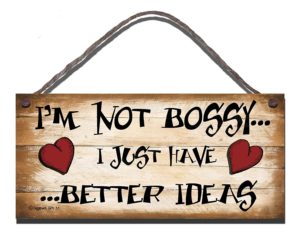This post may contain affiliate links. Full disclosure policy
THIS POST MAY CONTAIN REFERRAL LINKS. IF YOU CLICK THROUGH AND TAKE ACTION, I MAY BE COMPENSATED, AT NO ADDITIONAL COST TO YOU.
One of the things I love about life beyond 50 is the self-assurance that comes from experience.
That’s one of the qualities I wrote about in my previous post 6 Reasons It’s Great To Be Over 50. If you haven’t read that post yet, you might want to do so later. But the takeaway from one section is that in terms of human relations, spiritual insights, practical knowledge, and good old common sense, our five decades and beyond of life experience means we have a wealth of wisdom to draw upon and share with the world.
That’s a good thing, right?
Usually. But not always.
The B Word
Like so many of life’s gifts, depending on how we use it, the gift of experience can be helpful or harmful, either a ladder to help people lift themselves up, or a sledgehammer to knock them down.
I’m not sure why but lately I seem to be running into a lot these people, nearly all of them women aged fifty and beyond. It’s got me wondering if the downside of the confidence that comes with experience might be an overconfidence that discounts the experiences of other? A tendency to be a B word? You know, Bossy with a capital B!
How to tell if someone is bossy
Let me give you an example. Imagine that you’re chatting with a friend and mention that you’re about to make a big purchase – let’s say a car.
You tell your friend about make and model you’ve chosen, that you’ve found a place where you can buy the car you want at a good price, and that you’re very excited about getting your new vehicle.
And why wouldn’t you be excited? Buying a car is a pretty big deal!
But instead of sharing in your happiness, this friend shakes her head and says, “Oh, no. You don’t want that car. My neighbor had one and it was always breaking down. You should buy this car, from this dealer. I would never buy a car from that other place. They’re liars, cheats, and thieves. Nobody goes there.”
Or let’s say that the news you’re sharing isn’t so happy.
Imagine you tell the same friend that you were recently diagnosed with a potentially life-threatening illness.
You’re reeling from this shocking and unexpected news but as soon as you’ve finished talking, or maybe even before, your bossy friend launches into an unsolicited litany of advice, observations, and orders. She tells you about her experience with the same disease (or perhaps with a completely different one), outlining the treatments she underwent and the various doctors and medical facilities that were involved.
The implication is that the course of treatment she chose is the same one you should choose. Or, conversely, that her treatment was a disaster and that you absolutely must not undergo treatments A, B, or C performed by doctors D, E, or F.
But, in both scenarios, the insinuation is that her way is the right and only way, and that if you deviate from this by even one iota then you’re uninformed, foolish, and just plain wrong.
Sound familiar? Do you have bossy friend or family member? Or could you, without realizing it, be the bossy friend?
How to deal with the bossy people in your life
Before we confront our own bossy tendencies, let’s talk about some strategies to deal with the bossy people in your life. If you’ve been living long enough to be interested in a blog directed to life beyond 50, I’m pretty sure you’ve met some of these people.
- She’s trying to help. Recognize that your bossy friend is probably coming from a place of good intention and honestly thinks she’s helping. That won’t necessarily change the situation but, hopefully, it will help you extend her some grace and maintain your friendship.
- You’ve got this. Take a moment to recognize that your experience and knowledge is valid, even if you are sailing through previously uncharted waters. You’ve dealt with uncertainty in the past and you are capable of dealing with it now. Remind your friend of that – gently if possibly.
- Speak your mind. If you’ve already thought everything through and made a decision that feels right to you, gently communicate that to your friend by saying, “I really appreciate your concern and advice but I’ve already spent some time thinking about what direction I’d like to go and I feel good about that.”
Communication is everything
Even if you’re still thinking a situation through, don’t be bulldozed by a bossy friend. Instead, make a plan to obtain research that will help you make an informed choice. If your friend has something of value to offer, then her advice might go into the mix. But let her know that you’ll seek out that advice when and if you’re ready.
In this instance, you might say, “Thanks. I might need your advice later and it’s good to know I can reach out to you if I do. Right now, I just need a little time and space to think things through on my own.”
Most people, even the bossy ones, will get the message.
However, it’s possible that your bossy friend is what I call a “two-by-four person.” These are the people who have to be hit over the head with a two-by-four before they get it.
If so, use a more direct approach, such as, “I know you want to help but I’m honestly not asking for advice. What I really need right now is a friend who will listen.”
Ninety percent of the time, one these methods work. But some bossy people won’t back off no matter how heavy the hint. In this case, you might need to ask yourself if this friend really is a friend.
But, that’s a post for another day.
What to do if it’s you
Encountering several bossy people within a short period of time made me wonder if somebody was trying to send me a message. Was it possible that I was other people’s bossy friend?
The answer, much to my chagrin, was yes. Not always but sometimes.
Friendship is really important to me. I don’t have many friends but those I do have, I care about and keep close.
Thinking it through helped me realize that when I put on my bossypants, it’s because I genuinely wish to help. That doesn’t give me license to keep being bossy but it helps me give myself enough grace so I can do something about it.
Listen First
If we truly want to be a friend or help a friend, the first, last, and most important thing we can do is listen.
Sit in silence, let your friend talk, and really listen. Sounds easy enough but it can actually be tougher than you think – especially if you’re convinced you have something meaningful to say.
(I don’t really think I’m bossy – it’s just that my ideas are better!)
In case you’re still not quite sure about listening – let me spell it out. Listening is focusing on the other person’s words and what they want you know. Listening isn’t watching the other person’s lips move while you think about what you want them to know and how you will share that as soon as they take a breath.
Listen. Just listen. What most people want more than anything is to be heard.
When to share your 2 cents
Still, sometimes you might sense that your friend really does need advice. The easiest way to find out is simply to ask.
Depending on the situation, you might say, “Wow, I’m so glad you shared that. It sounds really exciting/upsetting/confusing. Would it help you to know what I did/didn’t do/ thought in a similar situation?”
Don’t be offended if the answer is no or not now. Sometimes people just need to work things out in their own way and in their own time. The fact that your friend is willing to be honest about her needs is a mark of trust in you. Recognize that, simply by listening, you’ve probably been a big help already.
When a friend says no to an offer of advice, a kind response might be, “That’s all right. If you change your mind later, just let me know. I’ll always be here for you, even if you just need to vent.”
If you are listening fully, you might not need to say a thing.
Experience is a wonderful teacher. It supplies us with confidence, self-assurance, and wisdom that we can share with the world.
Listening isn’t just the antidote to bossiness, it’s also the greatest gift we can offer to people we care about. In giving our silence and complete attention, we can say the things matter without uttering a word.
I hear you.
And I’m here for you.


